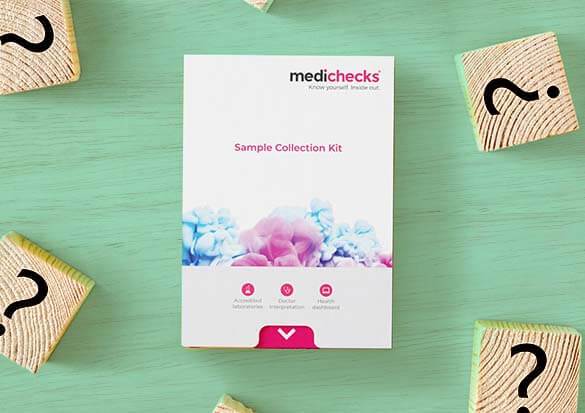All you need to know about the thyroid
From where it is to what it does, learn everything you need to know about the thyroid.
Thyroid conditions are common, yet many people don’t understand what the thyroid is, what it does, and all that can go wrong with it.
In this guide, we look at:
- What and where is the thyroid?
- What does the thyroid do?
- Why are thyroid hormones T4 and T3 important?
- What controls the thyroid?
- What can go wrong with the thyroid?
- What causes thyroid problems?
- What are the early warning signs of a thyroid problem?
- What puts me at greater risk of a thyroid problem?
- How are thyroid problems diagnosed?
- How to check in on your thyroid
What and where is the thyroid?
The thyroid is a small butterfly-shaped gland that sits at the front of the neck. It consists of two lobes that lie on either side of the windpipe (trachea), which are connected by a small tissue bridge called the isthmus [1].
What does the thyroid do?
The thyroid is an important part of the endocrine system that produces and regulates hormones that affect almost every cell in the body. Without thyroid hormones, the body would be unable to convert nutrients into energy.
The two main thyroid hormones are:
- Thyroxine (T4) – largely inactive, but is converted to T3 in the tissues
- Triiodothyronine (T3) – biologically active
Why are thyroid hormones T4 and T3 important?
When the thyroid is functioning properly, it produces a healthy balance of T3 and T4 hormones. Too much or too little of these hormones can give rise to unwanted symptoms. Thyroid hormones play a vital role in several bodily processes including regulating your heart rate and metabolism. This means thyroid conditions can have wide-ranging symptoms, from feeling tired all the time to fluctuations in weight.
Want to know more? Take a look at all you need to know about thyroxine (T4) and all you need to know about the thyroid hormone T3.
What controls the thyroid?
Thyroid hormones are controlled by a complex feedback loop involving:
- The hypothalamus – an area of the brain that is involved in the production of hormones
- The pituitary gland – a gland that works with the hypothalamus to produce hormones
- The thyroid gland
This system responds to the levels of thyroid hormones in the blood. For example, if thyroid hormone levels are too low, the hypothalamus will produce more thyroid-releasing hormone (TRH). TRH instructs the pituitary gland to produce more thyroid-stimulating hormone (TSH), which will in turn increase T4 and T3 production by the thyroid.
Therefore, your level of TSH will continually rise and fall, depending on the level of T3 and T4 in your blood, as well as many other factors.
You can read more about TSH in all you need to know about thyroid-stimulating hormone.
What can go wrong with the thyroid?
In some cases, the thyroid doesn't always produce the right amount of T3 and T4, which can give rise to symptoms such as weight changes or fatigue. This is known as a primary thyroid condition.
Other times, there is a problem with the hypothalamus or pituitary gland in the brain which causes too little or too much TRH or TSH to be released. This can have a knock-on effect on thyroid hormone levels and is known as a secondary or tertiary thyroid condition.
What causes thyroid problems?
Causes of thyroid function problems, include:
- An autoimmune disease – many cases of under- or overactive thyroid are the result of an autoimmune disease (where the healthy tissue in the body is attacked by the immune system). The most common thyroid autoimmune diseases are Hashimoto’s thyroiditis and Graves’ disease.
- A thyroid swelling or goitre – swelling or inflammation of the thyroid gland, sometimes presenting as a lump at the front of your neck. This might, but does not always affect thyroid function.
- Nodules – singular or multiple lumps within the thyroid gland. Although usually harmless, nodules on the thyroid should be looked at by a doctor to see whether they need to be treated or removed.
- Previous thyroid treatment - surgery or previous radioactive iodine therapy can permanently affect thyroid function.
- Medications - medications like lithium and amiodarone may affect thyroid function as a side effect.
- Inflammation - there are many types of thyroiditis (inflammation of the thyroid) that can affect thyroid function.
- Pituitary adenoma - growths in the pituitary gland can affect the production and regulation of TSH, but these are relatively rare.
- Cancer – thyroid cancer is a rare form of cancer in the UK and is more common in women than men. Survival rates for thyroid cancer are relatively high and, once detected, the thyroid gland can be removed, followed by hormone therapy. Radioactive iodine therapy is effective at killing thyroid cancer cells.
What are the early warning signs of a thyroid problem?
The early warning signs of a thyroid problem include symptoms such as tiredness, weight fluctuation, and sensitivity to temperatures. If a goitre is present, you might also notice a swelling of the thyroid gland.
Your symptoms will largely depend on whether your thyroid is under- or overactive.
For example, if you have an underactive thyroid, you may experience mood swings, loss of libido, and weight gain. If you have an overactive thyroid, you may experience weight loss (despite an increased appetite), shortness of breath, and insomnia.
What puts me at greater risk of a thyroid problem?
There are several causes of thyroid problems, with most cases either being caused by the immune system attacking the thyroid gland and damaging it, or by damage to the thyroid that occurs during some treatments for an overactive thyroid or thyroid cancer.
Anyone can develop a thyroid problem, but certain factors can increase your risk of developing a thyroid disorder, including age, family history, and lifestyle.
How are thyroid problems diagnosed?
Thyroid problems can take a while to be diagnosed and can often be mistaken for other conditions, such as mental health conditions. But the first step is usually a blood test to check your thyroid-stimulating hormone (TSH) level. From here, your doctor will decide on the necessary next steps – this could include further blood testing to test your other thyroid hormones (T3 and T4) and/or thyroid antibodies, or other diagnostic tools such as an ultrasound.
How to check in on your thyroid
You can check on your thyroid both internally and externally. However, a blood test is the only accurate way to find out whether your thyroid is functioning normally [1]. You can externally check for lumps or swelling around your thyroid by following our step-by-step video.
You can test your thyroid function from the comfort of your home with our range of Thyroid Blood Tests.
Not sure which thyroid blood test is right for you? Take a look at our Thyroid Blood Test Buying Guide or try our test finder.
Want to find out more about your thyroid? Head back to our Thyroid Hub.
References
- British Thyroid Foundation. 2022. Your thyroid gland. [online] Available at: <https://www.btf-thyroid.org/what-is-thyroid-disorder#:~:text=About%20one%20in%2020%20people,just%20below%20your%20Adam's%20apple> [Accessed 4 March 2022].
- Hartmann, PA-C, K., 2015. Thyroid Disorders in the Oncology Patient. Journal of the Advanced Practitioner in Oncology, 6(2).
- Underactive Thyroid Dagnosis (no date) NHS choices. NHS. Available at: https://www.nhs.uk/conditions/underactive-thyroid-hypothyroidism/diagnosis/#:~:text=A%20blood%20test%20measuring%20your,free%22%20T4%20(FT4). (Accessed: April 19, 2023).
Related tests
Get detailed insights into your thyroid function, including antibodies and nutrients essential for optimal thyroid health
- Results estimated in 2 working days
- 10 biomarkers
Finger-prick or Venous collection
Select testMonitor your thyroid health and detect any imbalances with our Thyroid Function Blood Test
- Results estimated in 2 working days
- 3 biomarkers
Finger-prick or Venous collection
Select testGet a comprehensive view of your thyroid health with this advanced test with antibodies
- Results estimated in 2 working days
- 5 biomarkers
Finger-prick or Venous collection
Select test




